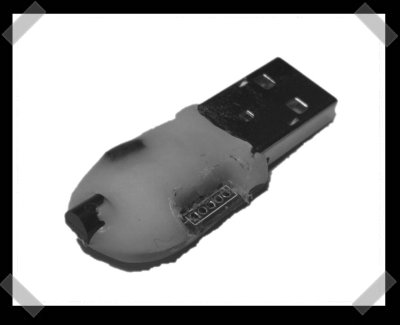
[Ned] sent in his USB temperature sensor. This little guy has a PIC controller, FTDI usb serial interface and a dallas temperature sensor. He managed to keep the cost very low – including the PCB.
15 thoughts on “USB Temperature Logger”
Leave a Reply
Please be kind and respectful to help make the comments section excellent. (Comment Policy)















Maybe you could take the temp sensor and put it on the end of some wire and collect valuable temperature data on internal components of the pc or anything else.
Wow – that is pretty sweet.
@1)
or just redesign it with a USB header plug rather than what’s on it.
good point dirk…
The temp sensor is the most expensive bit on it! If you want to do it cheaper you could use a small diode connected to the adc port. It would require calibration but after that its pretty accurate.
Heres a link to get anyone started
http://www.micro-examples.com/public/microex-navig/doc/098-temperature-sensor.html
Actually, this is not a logger but a USB temperature sensor: The sensor can’t save information (log) on it’s PIC.
It seems like using that $5 ftdi chip is really overkill for this application, why not just use a bit-banged USB port to talk to the computer? I am not sure if there is any decent usb code out for the pic12f675, but the attiny has the usbtiny libraries which are supposed to work well.
Also something interesting to point out, this board is essentially a usb->1wire converter, so you can add as many 1wire sensors (additional thermometers, generic a/d, even humidity etc) to the bus using a single controller board, just add code to talk to them.
If would be really sweet it someone took the time to set up a project that uses a cheep microprocessor (the attinys are about $2) with a bitbanged usb interface that has code which recognises a few generic 1wire sensors (I would do this temp sensor, and either a DS2450 or MCP25025 a/d to attach other sensors) and automatically recognises them, and outputs their data. So you make a converter board (which should cost about $5 in parts) to as many sensors that you need, without having to configure the controller.
[…] great idea. It would be trivial to do with either of these two GPL projects:-
i2c_tiny_usb uses an attiny45 and a few components to do usb->i2c converstion.
http://www.harbaum.org/till/i2c_tiny_usb/
This is also based on usbtiny but uses an atmega8. There are more outputs available on this one, and it uses a bootloader so USB firmware updates a fairly trivial.
http://www.robotfuzz.com/OSIF
(OK I admit it, the robotfuzz project its mine)
I would be more than willing to make some USB to 1-wire firmware, great idea.
B
A quickier and cheaper aproach (also more advanced) is to use a 18F series PIC like the 18F2450 it ahs an integrated USB port and is very easy to program if you know “C” (also java knowledge is enough coz is very similar to C), also you save on pieces just the Pic, a 8MHZ resonator, and a couple os caps, plus the thermocouple or thermistor and the USB connector, it comen in a SMD version too.
I am just curious if the LED will heat up the whole assembly and in return distort temperature readings?
@10
leds do not heat things up. the data would not be distorted.
koray — great catch. yes, with the thermoplastic casing (as shown on the site), the LED does infact distort the temperature reading. it distorts the readings by a significant (3-4 degree) amount. when i’ve built these more recently i’ve either left the LED off alltogether, or programmed the LED to only flash very briefly (like 200msec every 5 seconds, which seems to have no measurable effect).
I stand corrected.
Here is another way to build this.
It uses a $20 TI MSP430ez development kit.
http://www.designmsp430.com/second.aspx
It uses the MSP430 as the temp sensor.
Nice design & Idea. i want to do with an 8051 microcontroller and FDI chip with DS1820